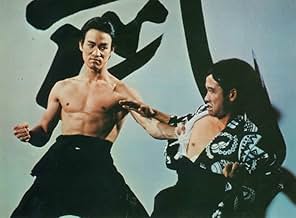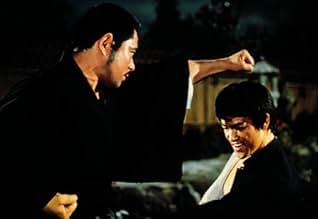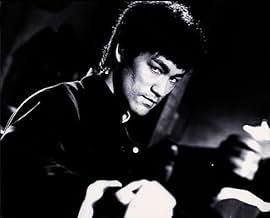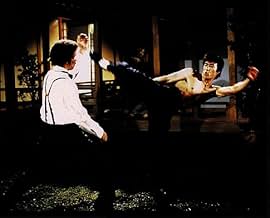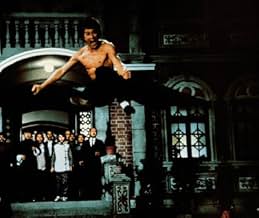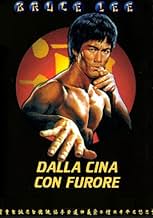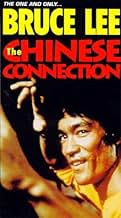During the Japanese occupation of Shanghai, the star pupil of a recently-deceased martial arts teacher battles a Japanese dojo which seeks the demise of his master's fighting school.During the Japanese occupation of Shanghai, the star pupil of a recently-deceased martial arts teacher battles a Japanese dojo which seeks the demise of his master's fighting school.During the Japanese occupation of Shanghai, the star pupil of a recently-deceased martial arts teacher battles a Japanese dojo which seeks the demise of his master's fighting school.
- Awards
- 2 wins & 1 nomination total
Nora Miao
- Yuan Le-erh
- (as Miao Ker Hsiu)
Chikara Hashimoto
- Hiroshi Suzuki
- (as Riki Hashimoto)
Ying-Chi Li
- Li
- (as Yin Chi Lee)
- Director
- Writer
- All cast & crew
- Production, box office & more at IMDbPro
Featured reviews
The second of the Bruce Lee-starring movies is in terms of plot a lot less interesting than the first. Here, we have the 'student sets out to avenge his master's death' which was already the major storyline of most martial arts films. However, it is handled in a more realistic way then usual and technically it is far superior. Lee was allowed to choreograph his own fights and his battle with Japanese martial artists in their school and climactic duels with a Russian boxer and a Japanese swordsman remains classic fight scenes.
The film drags somewhat in the middle although the lengthy dialogue scene between Lee and his girlfriend was another step forward for the Hong Kong martial arts movie, vivid proof that Lee was a pretty good ACTOR. By contrast, Lee's final farewell to his girlfriend is all the more powerful for being done completely without dialogue at all. The ending is the most powerful and moving of all the Lee films, the final freeze frame managing to encapsulate Lee's grace and power in a single shot.
Many mock Lee's films as being silly and just consisting of fighting. Both accusations are completely untrue. They have far less fights than most films of this kind and, at least in the three Hong Kong films he made, there is a clear message that violence does not solve anything. They may not have the polish of the more recent works of Jackie Chan and Jet Lee but their power remains undiminished, as long as of course one does not watch the awful dubbed versions!
The film drags somewhat in the middle although the lengthy dialogue scene between Lee and his girlfriend was another step forward for the Hong Kong martial arts movie, vivid proof that Lee was a pretty good ACTOR. By contrast, Lee's final farewell to his girlfriend is all the more powerful for being done completely without dialogue at all. The ending is the most powerful and moving of all the Lee films, the final freeze frame managing to encapsulate Lee's grace and power in a single shot.
Many mock Lee's films as being silly and just consisting of fighting. Both accusations are completely untrue. They have far less fights than most films of this kind and, at least in the three Hong Kong films he made, there is a clear message that violence does not solve anything. They may not have the polish of the more recent works of Jackie Chan and Jet Lee but their power remains undiminished, as long as of course one does not watch the awful dubbed versions!
From start to finish, the Chinese Connection (originally released as Fists of Fury) is probably the most entertaining and satisfying of all the Bruce Lee movies. Well paced, with creative and fairly realistic fight scenes distributed evenly, the movie keeps the audience's attention all the way through the long fight scene near the climactic end (I won't spoil the actual ending for you). The predictable revenge plot provides the emotional trigger to release Lee's rage-filled fights and his now-famous smashing of the "No Dogs or Chinese Allowed" sign. Equally famous is his "this time you eat paper, next time you eat glass" line. Viewers are also treated to the only on-screen kiss by Lee, some comical moments with Lee playing a bumbling telephone repairman, a cameo by director Lo-Wei as the chief inspector, and a soundtrack which effectively builds tension in the fight scenes. You won't recognize Jackie Chan as the stuntman for one of the Japanese martial artists who flies through the screen door. The most memorable part of this movie is Lee's dynamic vitality as he goes about his business, cocksure and confident, and with the goods to back it up. I am forever grateful to those who, in marketing this movie to the west, decided to dub only the dialogue and to leave Lee's original fight sounds untouched. As is evident in the US version of Return of the Dragon (aka Way of the Dragon), dubbing Lee's fight sounds is nothing short of a sin.
Undoubtedly Lee's most intense performance, Wei's powerful kung fu classic is ripe with anti-Japanese hysteria and propaganda, so much so that there's not a single pleasant Jap' in the movie (unlike the up-to-date modern re-make). That aside, essentially this is a riotous Bruce Lee vehicle, kicking out trademarks and smashing up all evil in the process. The plot (Lee's sifu poisoned by Japanese school in turn-of-the-century Shanghai) is a valid excuse to string a great line-up of fight sequences together, and what great action this is: Bruce pounds the lights out of a dojo full of evil Japs using only fists, feet and nunchakus, and the duel with Baker (Lee's real-life personal bodyguard) near the movie's end is sheer entertainment typified. Though based on factual events, the subject matter is vastly exaggerated. Nevertheless, as kung fu theatre goes, Fist of Fury is an immensely satisfying experience, and stands as probably Lee's best Hong Kong work.
What's not to love about Bruce Lee? Simple answer, nothing. Bruce Lee is the man who made Hong Kong and martial art films the way they are way today. This despite he only be able to do four films.
Set in the early twentieth century in the Japanese section of Shanghai, Fist of Fury tells the story Chen Zhen (Bruce Lee). He returns to the city to marry his fiancé but finds out that his master had died. He questions the official reason about how he was killed and the Japanese Bushidō school seek to close Chen's school. The Japanese plan to arrest Chen, learn the secret of the Fist of Fury and arrest every member of the school. Chen goes on a mission of vengeance, beating up and killing anyone who was involved in the Master's murder. But he has only three days to do it and uses his resourcefulness to avoid being arrested.
The story is skeleton thin, but who cares, it's Bruce Lee. And compared to most previous efforts in Hong Kong, Fist of Fury is pretty much Oscar worthy. Bruce Lee in trying to give Hong Kong films some story, and not just focus on the swordplay. The acting isn't exactly good. Bruce Lee and Nora Miao are the strongest performs. This film's winning feature (and the whole point of watching this type of film) is the martial arts sequence. Bruce Lee is obviously the best at what he does, beating up a lot of people on the way. The camera work is extremely well done, there is no shaky cam or over-editing that is a massive problem in today's cinema. Bruce Lee also uses his nunchakus which is always fun to see. Excellent viewing.
The film also has a couple of themes. There is the themes of vengeance and actions have consequence for everyone involved. There is also a major theme about Chinese and Japanese racism and the hatred the two nations have to each other. It was a nationalistic piece for the Chinese and show that they should be strong against the Japanese. This film was made when memories of World War II was still raw in the collective Chinese conscious.
A film for Bruce Lee fans.
Set in the early twentieth century in the Japanese section of Shanghai, Fist of Fury tells the story Chen Zhen (Bruce Lee). He returns to the city to marry his fiancé but finds out that his master had died. He questions the official reason about how he was killed and the Japanese Bushidō school seek to close Chen's school. The Japanese plan to arrest Chen, learn the secret of the Fist of Fury and arrest every member of the school. Chen goes on a mission of vengeance, beating up and killing anyone who was involved in the Master's murder. But he has only three days to do it and uses his resourcefulness to avoid being arrested.
The story is skeleton thin, but who cares, it's Bruce Lee. And compared to most previous efforts in Hong Kong, Fist of Fury is pretty much Oscar worthy. Bruce Lee in trying to give Hong Kong films some story, and not just focus on the swordplay. The acting isn't exactly good. Bruce Lee and Nora Miao are the strongest performs. This film's winning feature (and the whole point of watching this type of film) is the martial arts sequence. Bruce Lee is obviously the best at what he does, beating up a lot of people on the way. The camera work is extremely well done, there is no shaky cam or over-editing that is a massive problem in today's cinema. Bruce Lee also uses his nunchakus which is always fun to see. Excellent viewing.
The film also has a couple of themes. There is the themes of vengeance and actions have consequence for everyone involved. There is also a major theme about Chinese and Japanese racism and the hatred the two nations have to each other. It was a nationalistic piece for the Chinese and show that they should be strong against the Japanese. This film was made when memories of World War II was still raw in the collective Chinese conscious.
A film for Bruce Lee fans.
After seeing Fists Of Fury(a.k.a The Big Boss) on T.V, I was surprised that they showed his next movie The Chinese Connections(a.k.a Fist Of Fury) and I really enjoyed and I still love it, Bruce Lee was amazing, and his martial art skills were terrific, but what really amazed me the most was seeing him beating the s**t out of those japanese people, and fighting that Russian. This is the best movie Bruce Lee has made before starring in Enter The Dragon, and if you're a Bruce Lee fan please watch this movie, you'll love this.
Did you know
- TriviaJackie Chan doubled for Chikara Hashimoto for the scene where Chen kicks him out of the window. He took the kick and flew several feet. Bruce Lee immediately checked to see if he was okay. Chan played a guard Lee kills in Enter the Dragon (1973).
- GoofsWhen Bruce is spinning the two Bushido students in the Bushido school, they are clearly two lightweight dummies.
- Alternate versionsFor its original 1972 UK cinema release the BBFC requested a cut to remove a shot of a flying throat kick, though it appeared intact in all early theatrical prints and was possibly waived before release. In 1978 the film was withdrawn by BBFC director James Ferman (together with Enter the Dragon (1973)) and all nunchaku footage removed together with the previously mentioned throat kick, and these cuts, (totalling 2 mins 51 secs) would persist in all of the film's UK video releases. The cuts were fully restored for the 2001 Hong Kong Legends release.
- ConnectionsEdited into Game of Death (1978)
- SoundtracksAtmospheres
Written by György Ligeti
Performed by Das Orchester des Südwestfunks Baden-Baden
Courtesy of MGM Records
Brief excerpt, played twice, during dramatic death scenes
Details
Box office
- Budget
- $100,000 (estimated)
Contribute to this page
Suggest an edit or add missing content





